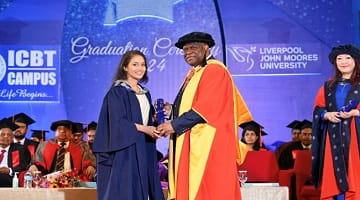2024/25 entry
MPhil, PhD Postgraduate research opportunities in the Built Environment
About this course
Excellent research opportunities await in the Dept. of the Built Environment, enabling you to work at the forefront of developments with leading experts.
- Study full or part-time over two to seven years
- Complete your research degree (MPhil/PhD) in a Faculty known for its internationally-acclaimed research
- Explore scholarship opportunities
- Benefit from expert supervision and researcher training
- Enjoy excellent facilities and great employment connections
The programme route you undertake will depend on your qualifications and experience.
On joining LJMU you will be allocated up to three supervisors (including a Lead Supervisor) who will work with you during your studies. Progression monitoring is undertaken formally and informally by this team on an ongoing basis.
Each year, each Faculty provides the University Research Degrees Committee with a summative report on the progress of all its eligible postgraduate research students.
Throughout your studies, you will also have the support of LJMU’s Doctoral Academy which offers expert advice and guidance to those enrolled on MPhil and PhD programmes.
Fees and funding
How to fund your postgraduate research
Securing funding can be one of the main hurdles you face when considering postgraduate research. However, help is available. LJMU has a team of fees and funding experts who can offer advice based on your personal circumstances. You can contact them on 0151 231 3153/3154 or via studentadvice@ljmu.ac.uk
Employability
Further your career prospects
LJMU has an excellent employability record with 96% (HESA 2018) of our postgraduates in work or further study six months after graduation. Our applied learning techniques and strong industry connections ensure our students are fully prepared for the workplace on graduation and understand how to apply their knowledge in a real world context.
Studying for a postgraduate research degree enhances your employability in a number of ways.
As well as enabling you to focus on your specific areas of interest and expand your subject knowledge ready for employment in your chosen sector, a postgraduate research qualification enables you to take charge of your career path by demonstrating your contribution to an area of knowledge. It enhances your self-confidence and showcases your ability to work independently and ‘go it alone’.
Some postgraduate research students are already in full-time employment when they begin their studies, whilst others are recent graduates looking to extend their research capabilities and subject expertise.
A good proportion of our students return to their existing roles with enhanced career prospects, others move on to further study or take up teaching roles in educational establishments.
According to a report by the Higher Education Statistics Agency (HESA), more than a quarter of graduates felt that their employment prospects were increased by their PG qualification. And when it comes to earnings, those with a postgrad qualification have been shown to earn an average of 24% more than those who leave education with an undergraduate degree.
The student experience
Discover life as a postgraduate student at LJMU.
News and views
Browse through the latest stories and updates from the University and beyond
Course modules
Discover the building blocks of your programme
Department of Built Environment
Explore the possibilities
The Department of Built Environment is recognised as one of the UK’s leading research centres for built environment and sustainability research and we are ranked in the top 15 higher education institutions working in this field.
In recent years, the Built Environment and Sustainable Technologies Research Institute (BEST) has secured more than £7 million of research funding, published close to 600 research papers, books and industry reports and enabled 40 research students to complete their PhDs.
BEST works collaboratively with leading international universities and research centres across the EU, the Middle East, the Far East, US, Norway and New Zealand. It is also supported internationally by the EU, UK and USA Ministry of Defence, Carbon Trust, Technology Strategy Board and has secured funding to develop a range of innovative projects from industrial partners such as United Utilities, Ministry of Defence, NHS, Tarmac and Taylor Woodrow.
Some 83% of LJMU’s built environment-related research submitted to the REF 2014 was considered of international importance or recognised internationally. This work, combined with our extensive links with professional bodies and employers, ensures that all of our studies are industry focused, globally relevant and at the forefront of knowledge development in this field.
Research by our Built Environment and Sustainable Technologies Research Institute (BEST) focuses heavily on applied research, closely linked to
Teaching
An insight into teaching on your course
To complement your research, specific training needs will be identified on an individual basis. You can study topics such as:
- Advanced Presentation Skills
- Applying for Ethical Approval
- How to be an Effective Researcher
- Poster Presentation/Design
- Postgraduate Employability Skills
- Project Management
- Writing Skills including Creative Planning for Writing your Thesis
- Surviving the Viva
- Speed Reading
Assessment
How learning is monitored on your programme
Final examination for both the MPhil and the PhD is by thesis and oral examination.
The MPhil differs from the PhD in terms of the depth of study required and the extent of your personal contribution to knowledge. It requires competence in conducting an independent enquiry as well as in the use of appropriate research methods and techniques. Examiners will expect you to display satisfactory background knowledge of the subject.
To gain a PhD you are expected to show mastery of a special field and to have made an original personal contribution to the understanding of a problem, the advancement of knowledge, or the generation of new ideas. Examiners will expect you to be at the forefront of understanding in your chosen topic.
School facilities
What you can expect from your School
We offer postgraduate researchers access to excellent teaching and learning facilities plus plentiful social spaces and, of course, support and guidance from our expert academics.
Entry requirements
You will need:
- For entry to MPhil - a 2:1 Honours degree in a relevant subject.
- For entry to PhD - a 2:1 Honours degree in a relevant subject, preferably also a Masters degree in a relevant subject.
- IELTS 6.5 minimum 5.5 in each component)
- 58-64 (minimum 51 in each component for UKVI purposes)
- RPL is accepted on this programme
Additional information:
We also welcome applications from those with non-standard qualifications who can demonstrate knowledge, experience, and skills developed in the workplace or other setting relevant to the programme of research.
If you do not hold the standard academic entry requirements, please use your personal statement to provide further details. Non-standard applications will be considered by the Admissions Tutor(s) on a case-by-case basis.
If you have any specific queries, please contact FETPGRAdmissions@ljmu.ac.uk
Application and selection
Securing your place at LJMU
All research degree registrations are subject to approval by the Faculty and University’s Research Degrees Committee. The Applications process is as follows:
- Complete and submit your application using this online form
- You will receive an acknowledgement
- Your application will be considered by the Admissions Tutor
- We will take up your academic references
- You may need to provide further information or attend an interview
- You will be informed if your application has been successful and will find out about any conditions of acceptance
The University reserves the right to withdraw or make alterations to a course and facilities if necessary; this may be because such changes are deemed to be beneficial to students, are minor in nature and unlikely to impact negatively upon students or become necessary due to circumstances beyond the control of the University. Where this does happen, the University operates a policy of consultation, advice and support to all enrolled students affected by the proposed change to their course or module.









